

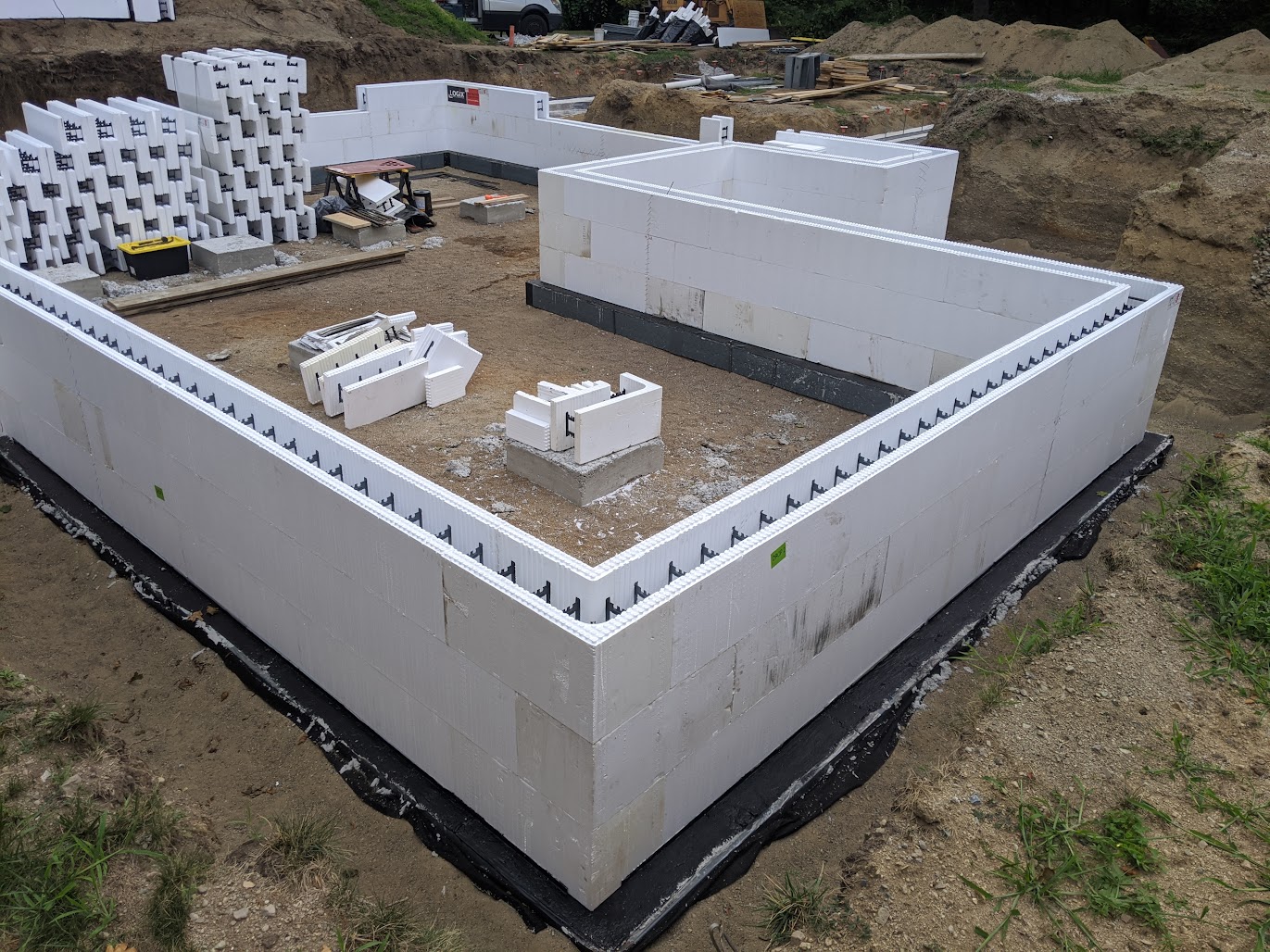
Build on a foundation that lasts generations. Our ICF foundation construction provides unmatched strength, energy efficiency, and moisture resistance compared to traditional poured concrete or block foundations.
Discover why icf foundations delivers superior results
ICF foundations are significantly stronger than traditional block or poured foundations, providing superior structural integrity.
Continuous insulation eliminates thermal bridging and keeps basements comfortable year-round.
Built-in moisture barrier prevents water infiltration and eliminates basement dampness issues.
Concrete mass and insulation provide exceptional noise reduction from outside sources.
Concrete and foam construction eliminates pest entry points and termite concerns.
While initial costs are comparable, long-term savings in energy and maintenance make ICF foundations highly economical.
From consultation to completion, we guide you through every step
We assess your site conditions, soil type, and building requirements to design the optimal ICF foundation system. Our engineers ensure proper sizing and drainage planning.

Professional excavation to exact specifications ensures proper foundation dimensions. We install footings, drainage systems, and utility rough-ins according to engineered plans.
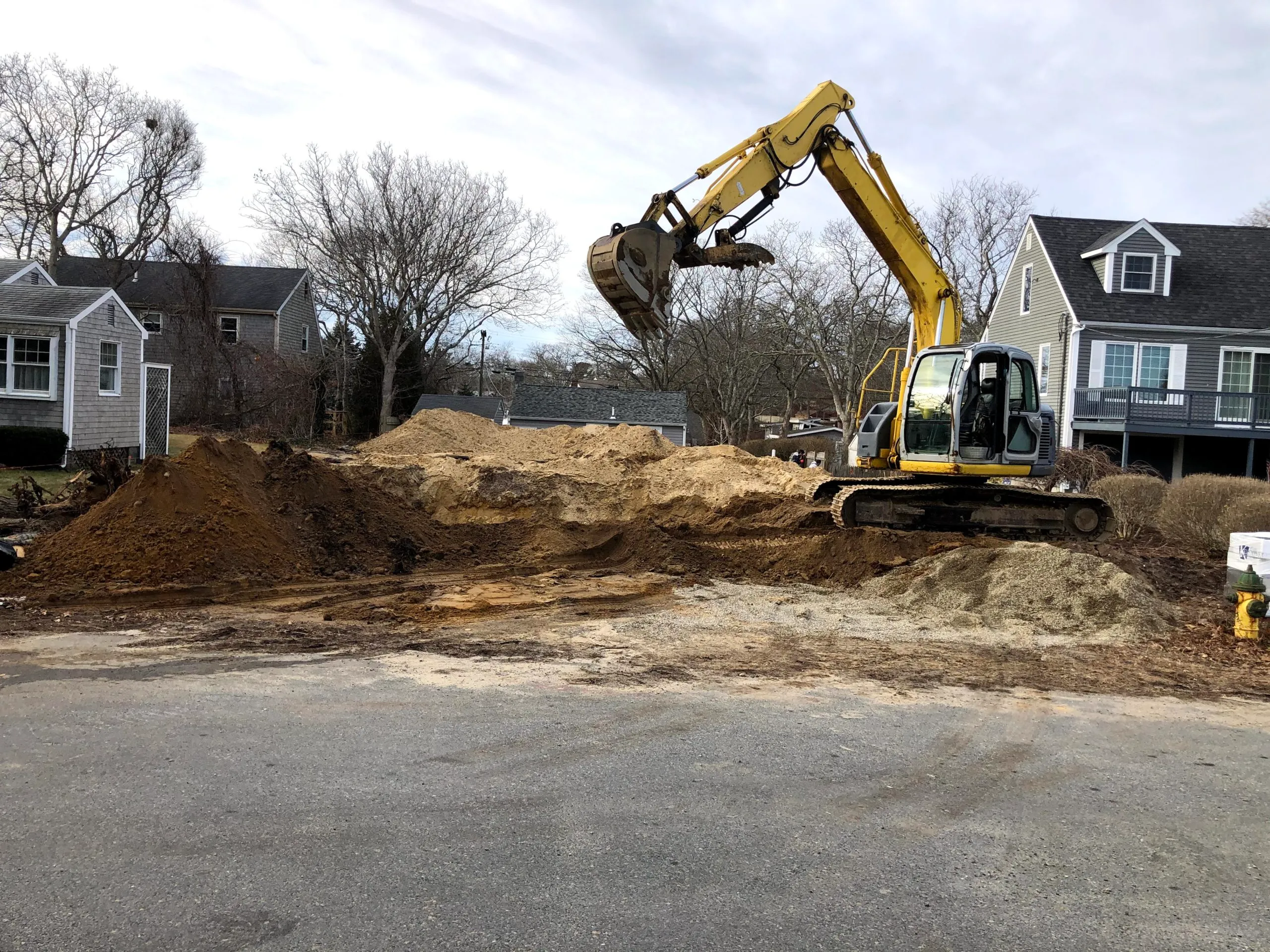
Our certified installers stack and brace ICF blocks, install reinforcement steel, and integrate all necessary penetrations for plumbing and electrical systems.
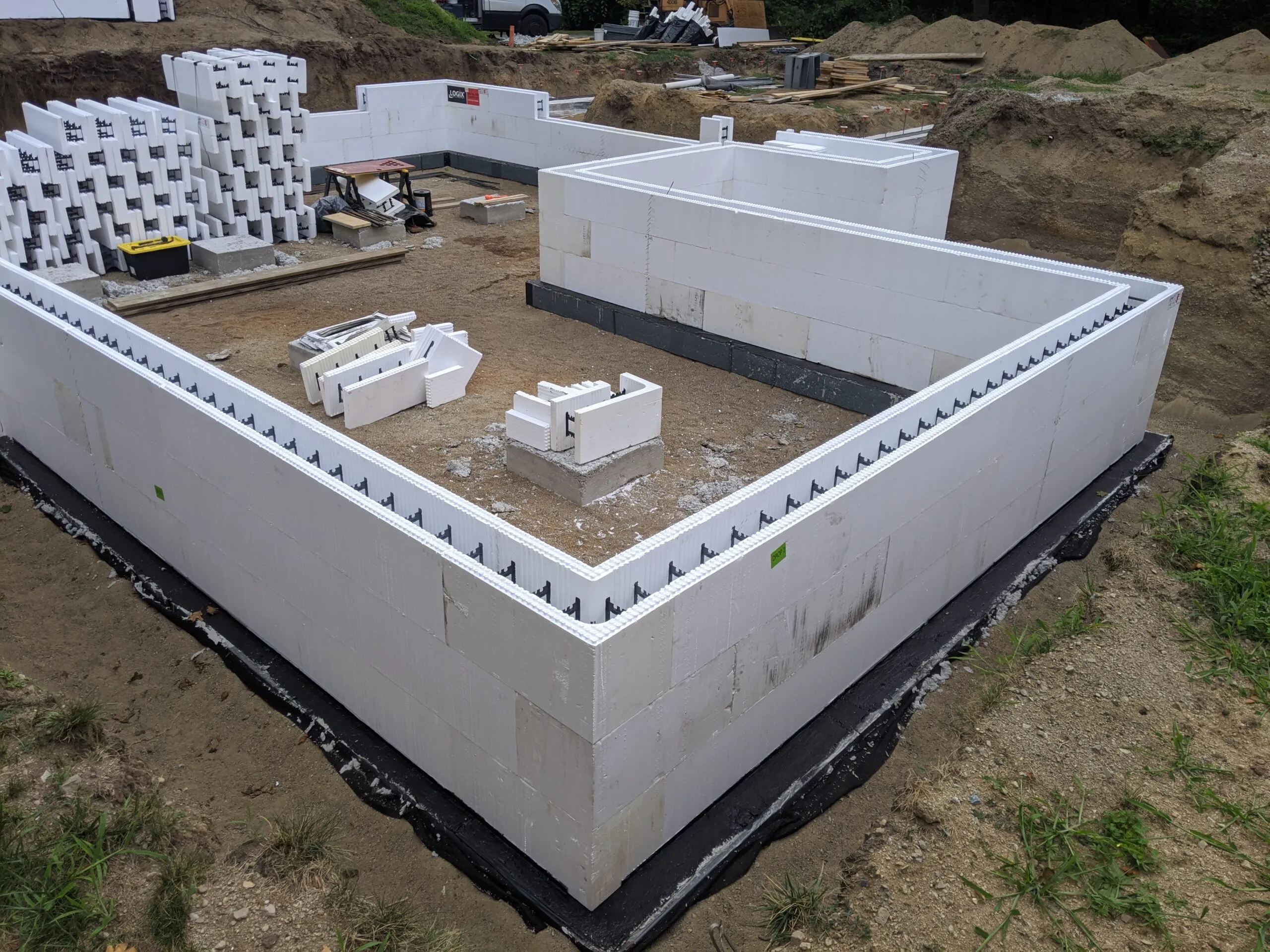
High-strength concrete is pumped into the ICF forms, creating a monolithic foundation. After curing, we complete waterproofing, backfilling, and final grading.
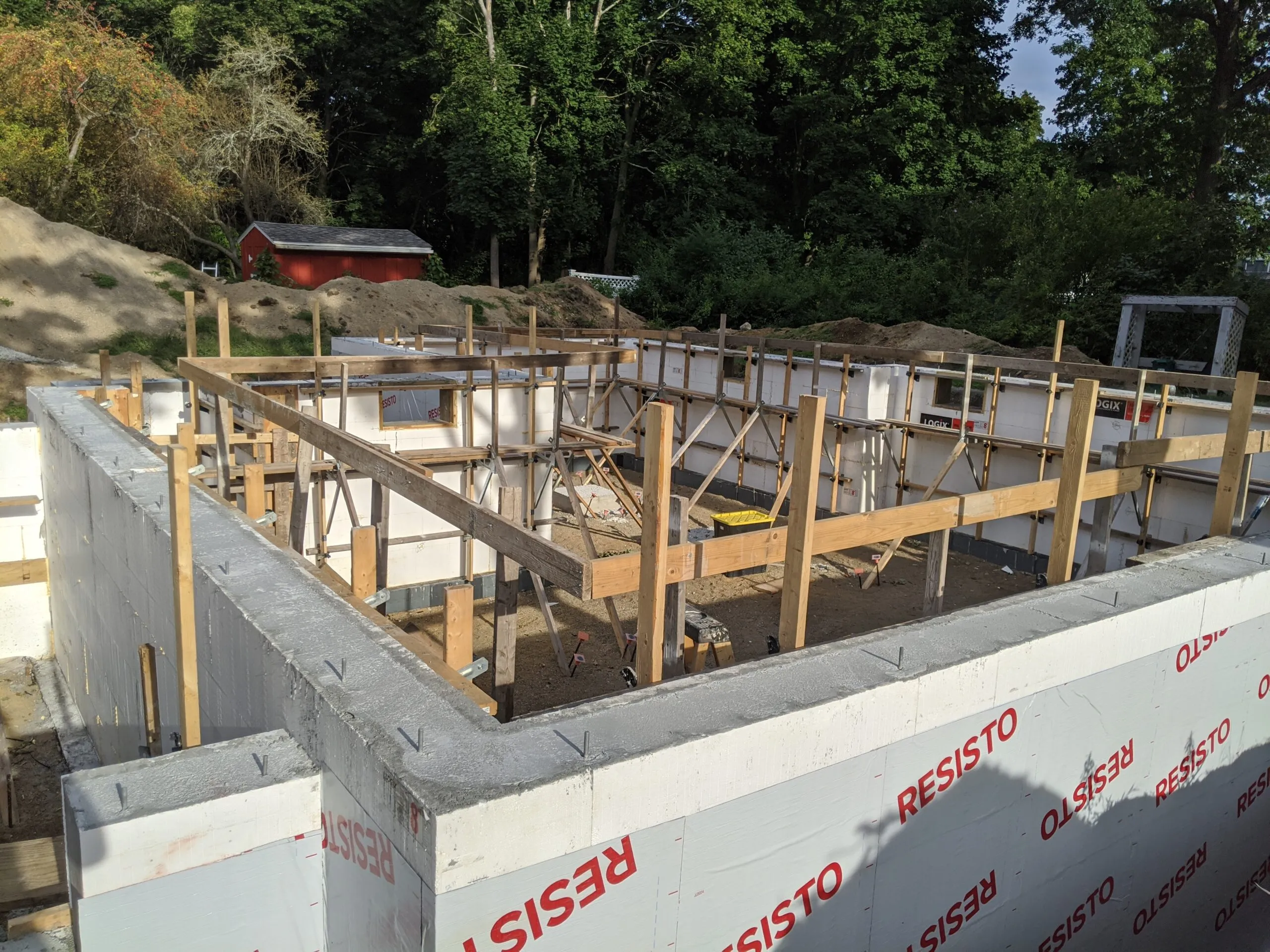
Double your living space at a fraction of cost with an ICF basement in your new home. Built with reinforced steel rebar and R28+ insulation, these comfortable, energy-efficient spaces are ready to finish with drywall, stucco, cement and more.
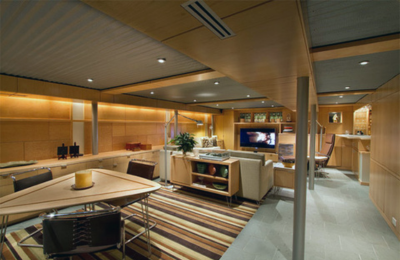
Home theater, game room, or family recreation space
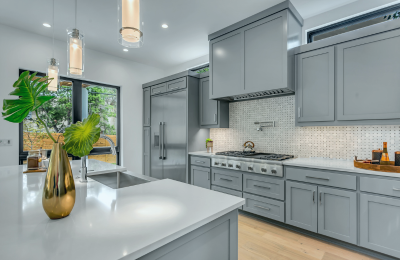
Independent apartment or studio for rental income
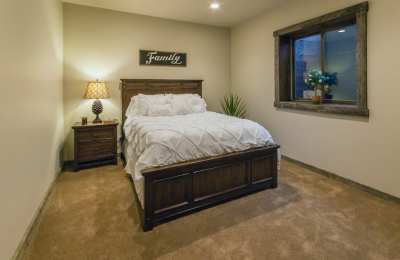
Comfortable guest suite with full privacy

Quiet, professional workspace for remote work
Get expert answers to the most common questions about ICF foundation construction, benefits, costs, and finishing options in Massachusetts.
An ICF (Insulated Concrete Form) foundation uses interlocking foam blocks filled with reinforced concrete to create a superior foundation system. Unlike traditional concrete block or poured foundations, ICF foundations provide continuous R-22+ insulation, are 6x stronger, completely moisture-resistant, and create comfortable basement spaces that can be easily finished into living areas.
ICF foundations are 6x stronger because they combine reinforced concrete with continuous steel rebar reinforcement in a monolithic structure. The interlocking foam forms create a solid concrete wall without joints or weak points found in block construction. This results in superior structural integrity that can withstand extreme weather, seismic activity, and heavy loads far better than traditional foundation methods.
ICF foundations are designed to last 100+ years with minimal maintenance. The concrete core is protected by the foam insulation from freeze-thaw cycles, moisture infiltration, and other environmental factors that degrade traditional foundations. Unlike block foundations that can crack and leak over time, ICF foundations maintain their structural integrity and waterproof seal for generations.
Yes, ICF foundations can be engineered for virtually any soil condition, from stable soil to challenging conditions like clay, sand, or areas with high water tables. The monolithic concrete structure and proper engineering make ICF foundations ideal for difficult sites where traditional foundations might fail. Our engineers design each foundation specifically for your site conditions.
ICF foundations typically save 60-80% on basement heating and cooling costs. The continuous R-22+ insulation eliminates the thermal bridging and heat loss common in traditional foundations. This means your basement stays naturally comfortable at 65-75°F year-round with minimal energy input, dramatically reducing your overall home heating and cooling costs.
Absolutely! ICF basements maintain comfortable temperatures of 65-75°F year-round without drafts or cold spots. The superior insulation and moisture control create comfortable, healthy living spaces perfect for family rooms, home offices, guest bedrooms, or rental units. Many homeowners find their ICF basements more comfortable than their above-ground rooms.
ICF foundations provide integrated moisture control that far exceeds traditional waterproofing methods. The monolithic concrete structure has no joints where water can penetrate, and the foam forms create a continuous moisture barrier. This eliminates the musty odors, mold growth, and moisture problems that plague traditional basements, creating healthier living environments.
Yes, ICF foundations virtually eliminate basement dampness and mold issues. The continuous insulation prevents condensation on walls, the integrated moisture barrier keeps water out, and the inorganic materials (concrete and foam) don't support mold growth like wood framing does. This creates a healthier basement environment that's safe for storage, living, and family activities.
ICF foundation construction typically takes 1-3 weeks depending on size and complexity. The process includes excavation (2-4 days), ICF installation (3-7 days), concrete pour and cure (1-2 days plus 7-day cure time), and waterproofing/backfill (2-3 days). While slightly longer than traditional methods, the superior quality and performance make the investment worthwhile.
Yes, ICF foundations can be built in winter conditions with proper precautions. The foam forms provide insulation during concrete curing, and heated concrete or insulation blankets can be used in extremely cold weather. ICF construction is actually more weather-tolerant than traditional foundation methods, allowing for more consistent construction schedules.
Utilities are easily integrated into ICF foundations through several methods: electrical conduits and boxes are placed in the foam before concrete pour, plumbing penetrations use sleeves and proper sealing, and HVAC connections are planned and sealed to maintain air barrier integrity. The solid concrete structure actually provides more secure utility mounting than hollow block foundations.
ICF construction requires standard foundation equipment plus concrete pumping equipment for proper placement. The forms are lightweight and stack easily by hand, but concrete pumping is necessary for proper placement in the forms. We bring all specialized equipment and have extensive experience with proper ICF installation techniques.
ICF foundations typically cost 15-25% more initially than traditional foundations, but this premium is quickly recovered through energy savings, reduced maintenance, and increased home value. When you factor in the finished basement potential and 60-80% energy savings, ICF foundations often provide positive ROI within 5-7 years.
Yes, ICF foundations significantly increase home value through superior energy efficiency, comfort, and durability. Homes with ICF foundations typically see 10-20% higher resale values, plus they sell faster due to documented energy savings and superior construction quality. The comfortable basement space also effectively doubles your usable living area.
Many insurance companies offer discounts of 15-25% for ICF construction due to superior fire resistance, wind resistance, and moisture control. The 4-hour fire rating and resistance to natural disasters make ICF foundations particularly attractive to insurers, especially in areas prone to severe weather or flooding.
Most homeowners see ROI within 5-8 years through energy savings, reduced insurance costs, and avoided maintenance. In Massachusetts, with average heating costs of $2,000-4,000 annually, ICF foundations can save $800-2,000 per year in energy costs alone. Add insurance savings and increased home value, and the payback is even faster.
Yes, ICF foundation walls can be finished with any standard material including drywall, paneling, tile, or stone. The flat, solid surface actually makes finishing easier than traditional block or poured concrete walls. You can create beautiful, comfortable living spaces that look and feel like above-ground rooms.
ICF foundations can provide 8-9 foot ceiling heights, creating true living spaces rather than cramped storage areas. The superior structural strength allows for taller foundation walls without compromising integrity. This makes ICF basements feel open and comfortable, perfect for any use from offices to entertainment rooms.
ICF basements are ideal for conversion into rental units or ADUs (Accessory Dwelling Units). The superior comfort, energy efficiency, and soundproofing make them highly desirable rental spaces that can command premium rents of $1,500-2,500/month. The excellent sound control means minimal disturbance between floors.
Windows and doors are installed using proper rough openings created during construction with bucks or frames. The solid concrete structure provides excellent support for large windows that bring natural light into basement spaces. Egress windows for bedrooms and proper waterproofing ensure code compliance and safety.
Yes, ICF foundations exceed all Massachusetts building code requirements. The 9th Edition Massachusetts Building Code fully recognizes ICF construction. ICF foundations easily meet or exceed requirements for insulation (R-19 minimum), structural strength, and energy efficiency. Many communities have adopted Stretch Code requirements that ICF foundations surpass with ease.
ICF foundations excel in Massachusetts' harsh freeze-thaw conditions. The continuous insulation prevents the concrete from experiencing temperature fluctuations that cause cracking in traditional foundations. The monolithic structure and protected concrete core eliminate freeze-thaw damage that commonly affects block and poured foundations in New England.
Yes, ICF foundations require standard building permits, which we help obtain. Local building departments throughout Massachusetts are familiar with ICF construction. The permitting process includes structural engineering, energy compliance calculations, and sometimes architectural review. Our experience with Massachusetts codes ensures smooth permit approval.
ICF foundations are excellent for areas with high water tables common in Massachusetts. The monolithic concrete structure and integrated waterproofing system resist hydrostatic pressure better than traditional foundations. Proper drainage design and waterproofing ensure dry basements even in challenging groundwater conditions.
Get a free consultation and cost estimate for your ICF foundation project in Massachusetts.
Contact us today for a free consultation and discover how icf foundations can benefit your project.
Discover more ways BlueGreen Building Concepts can help you
Ready to start your ICF construction project? Contact us today for a free consultation and discover how we can build your dream home that lasts for generations.
Plymouth County, Norfolk County, Middlesex County,
and the Greater Boston Area